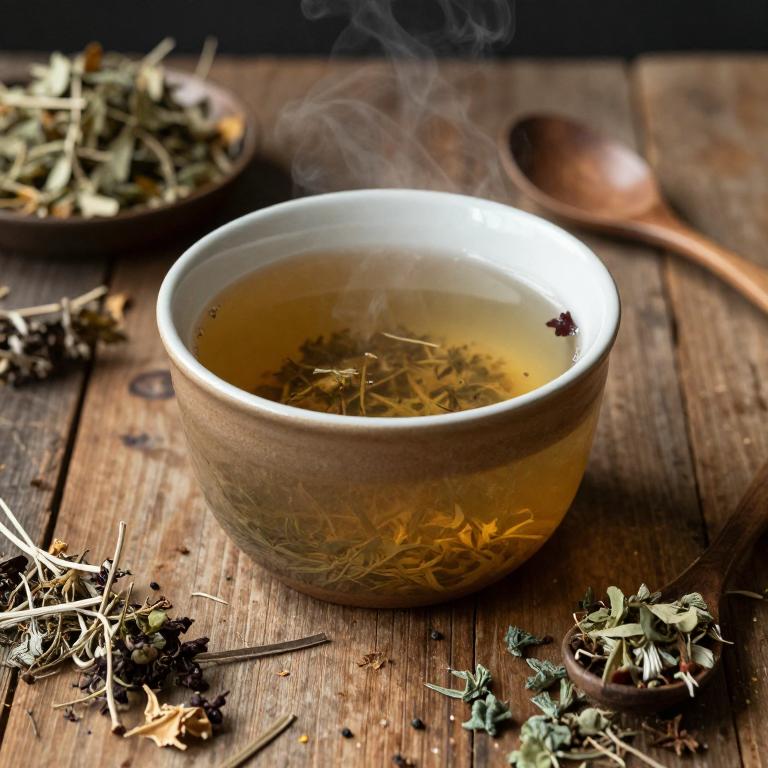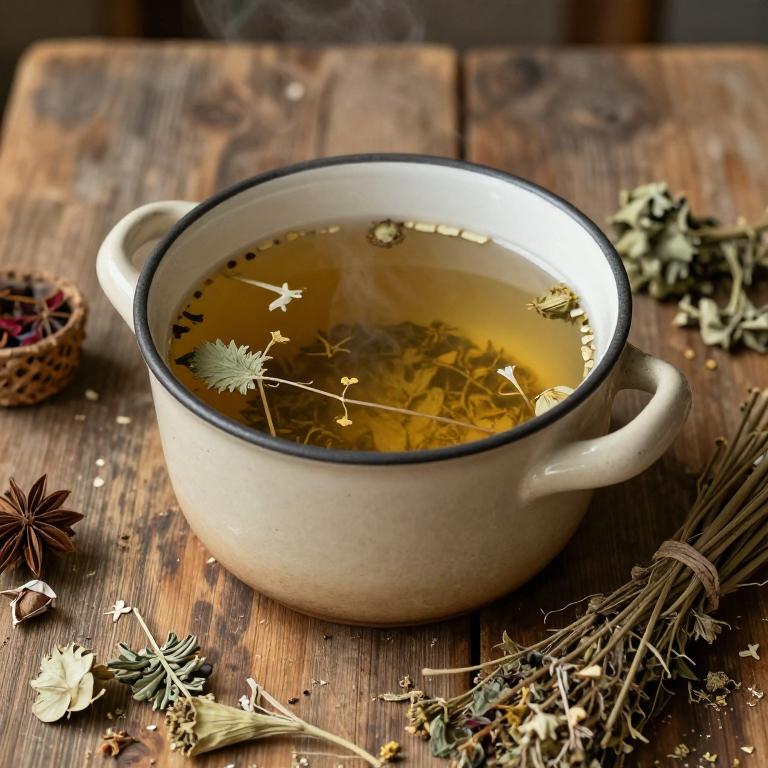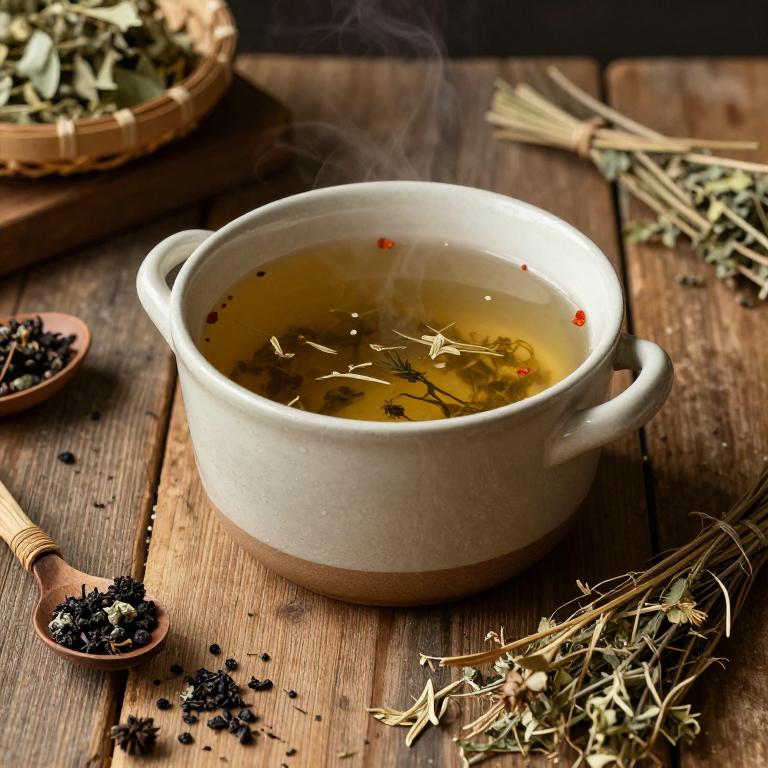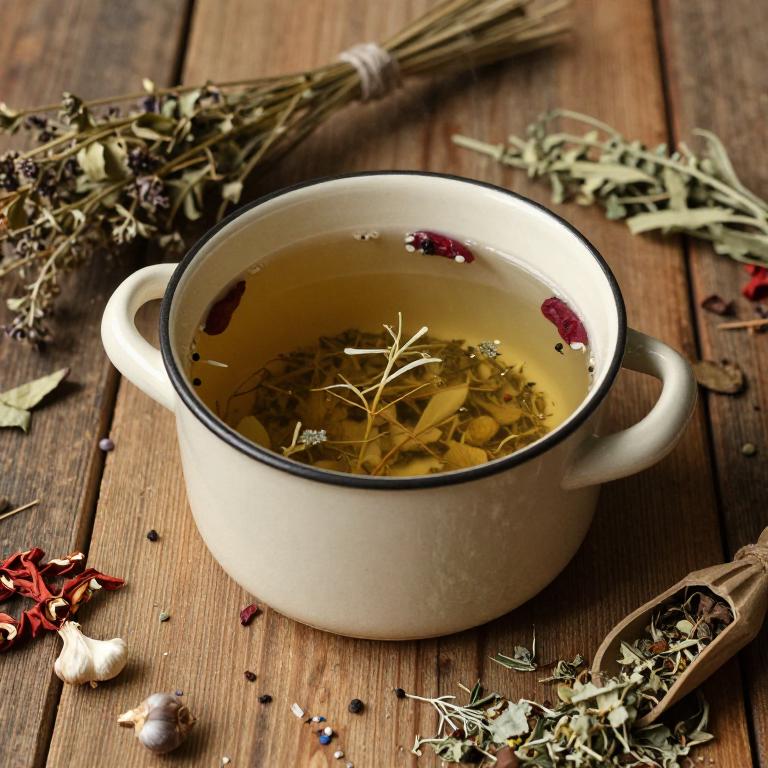10 Best Herbal Decoctions For Coughing Fits

Herbal decoctions have been traditionally used to alleviate coughing fits by harnessing the medicinal properties of various plants.
Common herbs such as thyme, licorice root, and eucalyptus are often included in these formulations due to their expectorant and anti-inflammatory effects. To prepare a decoction, the herbs are typically simmered in water for an extended period to extract their active compounds. This method allows for the gradual release of beneficial compounds that can soothe irritated airways and reduce mucus production.
While herbal decoctions can be effective for mild to moderate coughs, it is advisable to consult a healthcare professional before use, especially for persistent or severe symptoms.
Table of Contents
- 1. Eucalyptus (Eucalyptus globulus)
- 2. Thyme (Thymus vulgaris)
- 3. Ginger (Zingiber officinale)
- 4. Rosemary (Rosmarinus officinalis)
- 5. Fennel (Foeniculum vulgare)
- 6. Parsley (Petroselinum crispum)
- 7. Black elderberry (Sambucus nigra)
- 8. Peppermint (Mentha piperita)
- 9. Ceylon cinnamon (Cinnamomum verum)
- 10. Chamomile (Matricaria chamomilla)
1. Eucalyptus (Eucalyptus globulus)

Eucalyptus globulus, commonly known as the Tasmanian blue gum, is often used in herbal decoctions to alleviate symptoms of coughing fits.
The leaves of this plant contain compounds such as eucalyptol, which possess antiseptic and expectorant properties, helping to loosen mucus and reduce irritation in the respiratory tract. To prepare a decoction, the leaves are typically simmered in water for several minutes, allowing the active compounds to infuse into the liquid. This herbal remedy is often used in steam inhalation or as a gargle to soothe sore throats and ease breathing.
While generally safe, it is advisable to consult a healthcare professional before using eucalyptus globulus, especially for prolonged or severe coughing fits.
2. Thyme (Thymus vulgaris)

Thymus vulgaris, commonly known as thyme, has been traditionally used in herbal medicine for its soothing properties, particularly in alleviating coughing fits.
The essential oils found in thyme, such as thymol and carvacrol, possess antimicrobial and anti-inflammatory effects that can help reduce respiratory irritation and mucus production. When prepared as a herbal decoction, thyme is typically steeped in hot water to extract its active compounds, making it an easy and accessible remedy for those suffering from persistent coughs. This decoction can be consumed several times a day to provide relief and support the body's natural healing processes.
While thyme is generally safe, it is advisable to consult a healthcare professional before using it, especially for individuals with allergies or those taking other medications.
3. Ginger (Zingiber officinale)

Zingiber officinale, commonly known as ginger, has been traditionally used in herbal medicine to alleviate symptoms of coughing fits due to its anti-inflammatory and expectorant properties.
When prepared as a herbal decoction, ginger is typically simmered in water to extract its active compounds, including gingerol and shogaol, which help soothe irritated airways and reduce mucus buildup. This decoction can be consumed warm to provide relief from persistent coughing and associated throat irritation. Its warming effect also helps to improve circulation and ease respiratory discomfort.
While generally safe, individuals with gastrointestinal sensitivities or on certain medications should consult a healthcare provider before using ginger decoctions for coughing fits.
4. Rosemary (Rosmarinus officinalis)

Rosmarinus officinalis, commonly known as rosemary, has been traditionally used in herbal decoctions to alleviate coughing fits due to its antispasmodic and expectorant properties.
When prepared as a decoction by simmering the dried leaves in water, rosemary helps soothe irritated airways and reduce the frequency of coughing episodes. The essential oils in rosemary, such as camphor and pinene, contribute to its bronchodilating effects, making it beneficial for respiratory discomfort. This herbal remedy is often combined with other herbs like thyme or eucalyptus to enhance its effectiveness in treating persistent coughs.
However, it is important to consult a healthcare professional before using rosemary decoctions, especially for individuals with allergies or underlying health conditions.
5. Fennel (Foeniculum vulgare)

Foeniculum vulgare, commonly known as fennel, has been traditionally used in herbal medicine to alleviate coughing fits due to its expectorant and antispasmodic properties.
A decoction of fennel seeds or leaves can be prepared by simmering them in water for several minutes, allowing the active compounds such as anethole and apiole to infuse into the liquid. This herbal remedy is often consumed as a warm tea to soothe irritated airways and reduce throat inflammation, making it particularly effective for dry or productive coughs. The aromatic compounds in fennel also help to relax bronchial muscles, easing breathing and reducing the frequency of coughing episodes.
While generally safe, it is advisable to consult a healthcare professional before using fennel decoctions, especially for prolonged use or in individuals with known allergies or medical conditions.
6. Parsley (Petroselinum crispum)

Petroselinum crispum, commonly known as parsley, has been traditionally used in herbal medicine for its potential respiratory benefits.
Its leaves contain compounds such as apiol and limonene, which may help to soothe the respiratory tract and reduce inflammation. Herbal decoctions made from parsley are often prepared by simmering fresh or dried leaves in water to extract these beneficial properties. Some traditional remedies suggest that parsley decoctions can help alleviate coughing fits by promoting mucus expulsion and easing bronchial congestion.
However, while anecdotal evidence supports its use, further scientific research is needed to fully establish its efficacy for treating coughs.
7. Black elderberry (Sambucus nigra)

Sambucus nigra, commonly known as European elderberry, has been traditionally used in herbal medicine to alleviate symptoms of respiratory ailments, including coughing fits.
Its decoctions, made by boiling the berries or flowers in water, are believed to possess antiviral and anti-inflammatory properties that may help soothe irritated airways. While some studies suggest that elderberry may support immune function, its effectiveness in treating coughs specifically remains inconclusive and requires further scientific validation. It is important to note that raw elderberries can be toxic, so proper preparation is essential to ensure safety.
As with any herbal remedy, it is advisable to consult a healthcare professional before use, especially for individuals with chronic conditions or those taking other medications.
8. Peppermint (Mentha piperita)

Mentha piperita, commonly known as peppermint, has been traditionally used in herbal medicine to alleviate symptoms of coughing fits.
Its essential oils, particularly menthol, possess expectorant and soothing properties that help loosen mucus and reduce throat irritation. A peppermint herbal decoction can be prepared by steeping dried leaves in hot water, creating a comforting and aromatic tea. This remedy is often recommended for its ability to ease respiratory discomfort and promote easier breathing.
However, it is important to consult a healthcare provider before using peppermint decoctions, especially for individuals with asthma or gastrointestinal sensitivities.
9. Ceylon cinnamon (Cinnamomum verum)

Cinnamomum verum, commonly known as true cinnamon, has been traditionally used in herbal medicine for its soothing properties, particularly in addressing respiratory issues such as coughing fits.
When prepared as a decoction, the bark of the cinnamon tree is simmered in water to extract its essential oils and active compounds, including eugenol and cinnamaldehyde, which possess anti-inflammatory and antimicrobial effects. This herbal decoction can help reduce throat irritation and ease bronchial congestion, providing relief from persistent or productive coughs. It is often recommended to drink the decoction warm, optionally combined with honey or ginger for enhanced therapeutic benefits.
However, it should be used with caution, as excessive consumption may lead to gastrointestinal discomfort or interact with certain medications.
10. Chamomile (Matricaria chamomilla)

Matricaria chamomilla, commonly known as chamomile, has been traditionally used in herbal medicine for its soothing and anti-inflammatory properties.
When prepared as a decoction, chamomile can help alleviate coughing fits by calming the respiratory tract and reducing irritation. The active compounds in chamomile, such as flavonoids and bisabolol, contribute to its expectorant and antispasmodic effects. To prepare the decoction, steep 1–2 teaspoons of dried chamomile flowers in hot water for 10–15 minutes.
While generally safe, it is advisable to consult a healthcare professional before using chamomile, especially for prolonged use or in individuals with allergies or existing medical conditions.